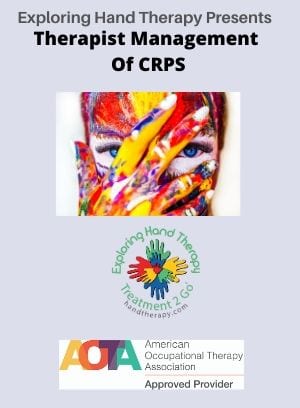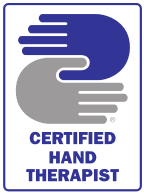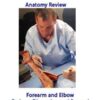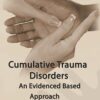
CRPS: Updates in Therapist Management
| CONTACT HOURS: | 5 Hours |
| CEU: | 0.5 |
| AOTA: |
OTP, Professional Issues, Check Accreditation
|
| NBCOT®: | 7.5 PDUs |
| STATE: |
AL BOARD 6hrs FL AOTA #3397 6hrs |
Susan shares updates in CRPS in this 4 part series. She discusses the neuromatrix of the brain and neurotags and how pain is 100% output of the brain. She reviews difficult concepts and makes them understandable.
Buy Now
$189.00
Description
Description:
This is a revolutionary course. The changes in treatment of CRPS are significant. You will really enjoy the presentation Susan shares and the clear examples of how to treat patients with CRPS. Help your patients become empowered with retaining of the brain.
This course is an independent, self-paced course delivered via online access.
Level: Intermediate
Target Audience: OT’s, PT’s
Criteria for Completion: 80% or higher on the post test. No partial credit will be awarded. Scores of less than 80% indicate a failure to understand the material and the test will need to be taken again until a passing score has been achieved.
Presenter Disclosure: Non-financial: Susan Stralka has no relevant-financial relationships to disclose. She receives payment from Live Conferences for this presentation.
Content Disclosure: This learning event does not focus exclusively on any specific product or service
See our FAQ for our cancellation policy: https://www.liveconferences.com/faqs/
If you need accommodations to take this course, please contact us and we will address your needs on an individual basis.
Objectives:
- Identify the modern-day term used for CRPS/ RSD.
- Outline terminology regarding pain.
- Determine what patients are at risk for CRPS
- Describe what central sensitization means and how it affects caring for patients.
- Interpret the definition of pain, areas involved in pain and how pain is output.
- Evaluate how pain starts and how pain can change to pathological pain.
- Interpret the Budapest criteria and how it facilitates the diagnosis of CRPS.
- Determine how to avoid stimulating or causing painful neurotags to fire.
- Explain how neuroscience education is important to use with patients with CRPS.
- Determine how to increase functional activities for patients with CRPS as they get better.
- Associate nerve blocks and when they are applied and not applied.
- Apply tools that will help calm the brain, reduce negative thinking, and improve body imagery.
- Explain the biopsychosocial approach and how it is changing the thought process of pain and where it is coming from.
- Apply how cognitive behavioral restructuring fits in the scope of our practice.
- Identify top-down treatment strategies to improve function.
- Determine when to use graded motor imagery, mindfulness, yoga, reiki or other techniques.
- 4 movie sessions with Susan sharing details of diagnostics to treatment for CRPS
- Includes downloads of Budapest criteria, CSI inventory, Tampa Kinesiophobia scale, McGill pain scale
- Provides access to Susan’s recommended expert in guided imagery and mindfulness
Outline:
Video 1:
0-15 mins: Definitions of Pain Types
15-20 mins: Risk factors
21 -35 mins: Identification of CRPS, the brain and pain
36 – 1:15: Signs and Symptoms of CRPS, Criteria
Video 2:
1 – 15 mins: Mechanism of central sensitization
1: 15 – 1: 45: Therapists Management
Video 3:
1 – 5 mins: What we know about pain
5 – 10 mins: Pain Neuroscience/ Biopsychosocial aspects of pain
11 – 15 mins: Psychosocial Aspects of Pain
16 – 35 mins: Central nervous system changes
Video 4
1 – 10 mins: Central Sensitization Review
11- 25 mins: Brain Activation with CRPS
25 – 35 mins: GMI
35 – 45 mins: Laterality
46 – 1 hr: Moseleys Second Sequence
1:02 – 1:25: Laterality – Imaging – Mirror
1:26 + What after GMI?
- Participants have one year to access the CEU course and exam to obtain CEUs.
- NBCOT® is a registered trademark of the National Board for Certification in Occupational Therapy, Inc. and does not promote or endorse our specific courses, services or training.

Treatment2go is an AOTA Approved Provider of professional development. PD approval ID #3397. This distance learning-independent activity is offered at 0.5 CEU’s, intermediate, foundational Knowledge. The assignment of AOTA CEU Does not imply endorsement of specific Course content, products, or clinical Procedures by AOTA.









Reviews
There are no reviews yet.